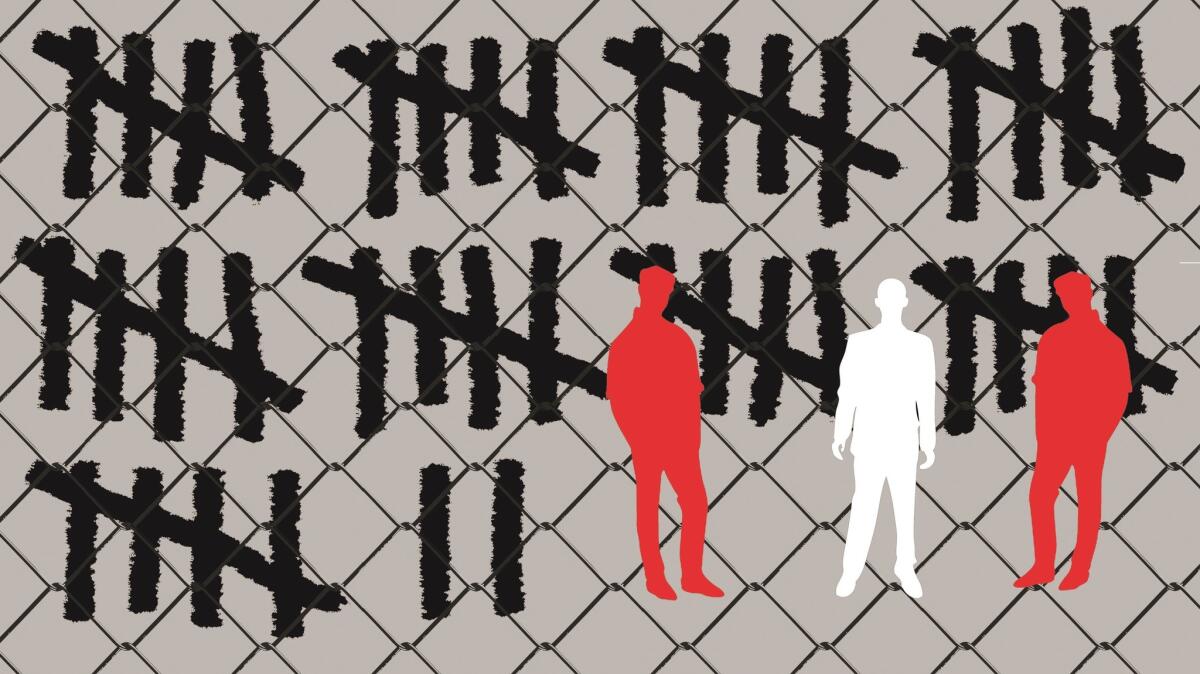Op-Ed: California’s Prop. 47 revolution: Were the voters duped?

- Share via
Police and prosecutors have lately attempted to link increases in crime to last year’s Proposition 47. Based on their overwrought statements, it would be understandable for Californians to start wondering whether they had been duped into completely decriminalizing drug possession and petty theft. They could be forgiven for asking whether it’s really the case that their law enforcement officers can no longer arrest thieves for stealing guns or breaking into cars, or have no option but to write tickets while watching all manner of mayhem unfold before them. They might hear that addicts have lost any incentive to choose drug treatment or to show up for court hearings.
None of those things are true, although officials in many communities throughout California appear to sincerely, although mistakenly, believe them. As is the case with all large bureaucracies, it is difficult for courts and for city and county agencies — police departments, sheriff’s departments, district attorneys, probation officers, county supervisors — to understand and constructively respond to changed circumstances. And Proposition 47 no doubt brought change, by converting six felonies to misdemeanors and allowing many people serving sentences for those crimes, and those who served their time long ago, to be resentenced and have their rap sheets adjusted.
We’d probably be better off if the various links in the public safety chain had opted to temporarily stick with their old practices following last November’s vote: if police kept arresting people for crimes reclassified as misdemeanors, and transporting suspects to jail and to court for arraignment, for example; and if prosecutors considered the circumstances (Is this the defendant’s first arrest for drug possession? The eighth?) and occasionally opted to seek the full sentence (up to a year behind bars); and if courts offered diversion or rehabilitation as an alternative — all of which not only remain available, despite assertions to the contrary, but absolutely must be used, selectively, if Proposition 47 is to work properly. They could have spent the last year examining their options and carefully and deliberately adjusting their practices so as to bring the maximum amount of public safety to the communities they patrol.
It’s as if police are saying to California voters: “Fine. You don’t think we should treat drug crimes and petty thefts seriously? Then we won’t. See how you like it.”
Instead, arrests for drug possession and other former felonies this year have plunged, leaving many offenders on the street unsupervised to commit petty crimes or worse. The voters, many police explain, have told us that they want us to turn our attention to other crimes, so that’s what we’re doing.
But there’s at least some element of petulance in that position. It’s as if police are saying to California voters: “Fine. You don’t think we should treat drug crimes and petty thefts seriously? Then we won’t. See how you like it.”
Crime in Los Angeles and some other communities throughout the state has increased this year after many years of decline. But is that because of Proposition 47? Other American cities, where Proposition 47 has no effect, have seen similar increases.
If the ballot measure is connected to rising crime, that’s probably because public officials have been too slow to recognize the options that the measure gives them. And it’s likely that their decisions — a deputy’s decision not to arrest, for example, or the sheriff’s not to make room in the jail for a recidivist offender pending trial, or county supervisors’ not to use any of the hundreds of millions of dollars currently available for non-jail alternatives — are based on suppositions about how the other links in the public safety chain will react.
A misdemeanor arrest would be futile, deputies say, because the watch commander would just release the suspect at the station, or the judge would just release him at court because the sheriff has no room in the jail — except that with arrests down, sheriffs suddenly have far more room, and every link in that chain has more opportunities than ever before to break the cycle of recidivism.
The gist of the reaction against Proposition 47 is that we as a society simply have no choice but to make possession of drugs and petty theft into felonies punishable by more than a year in prison if we want to control more serious crime. Similar warnings were issued about the consequences of modifying the three-strikes law, yet recidivism among strikers released from prison after voters adopted Proposition 36 is astonishingly low. And similar arguments were made against redirecting some felons from state prison and state parole to county jail and county probation, yet crime rates after realignment continued to fall.
In the coming week, The Times’ Opinion section — the Opinion L.A. blog, the editorial board and the Op-Ed page — will explore the repercussions of Proposition 47, and compare this episode in criminal justice history with similar recent changes that also produced periods of adjustment. The goal is not to defend the voters’ decision but rather to seek some honest talk, some accountability and some effective action on the part of public officials who are responsible for providing public safety, justice and wise and effective spending.
Robert Greene is a member of The Times editorial board.
Follow the Opinion section on Twitter @latimesopinion and Facebook
More to Read
A cure for the common opinion
Get thought-provoking perspectives with our weekly newsletter.
You may occasionally receive promotional content from the Los Angeles Times.











